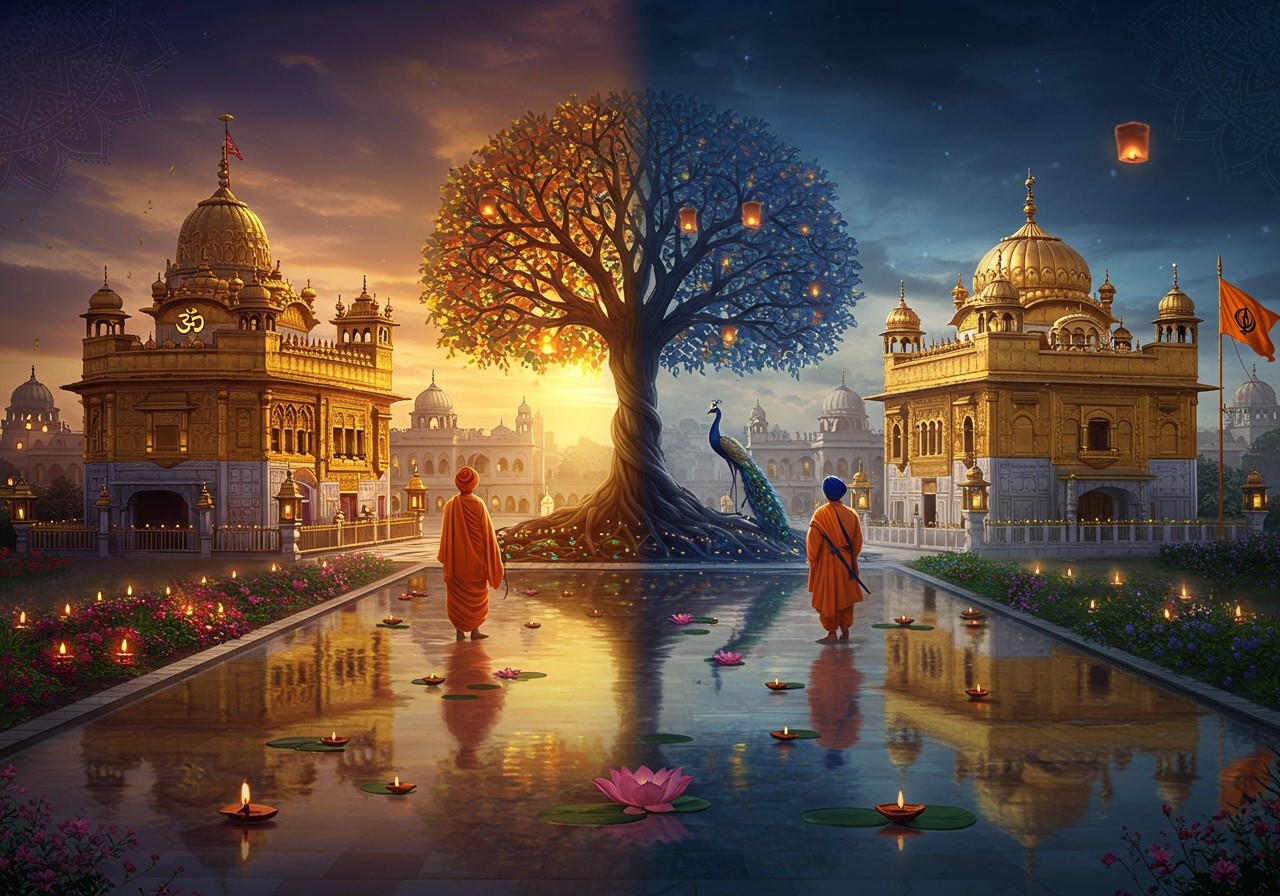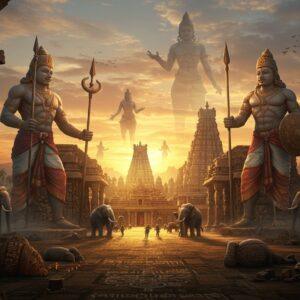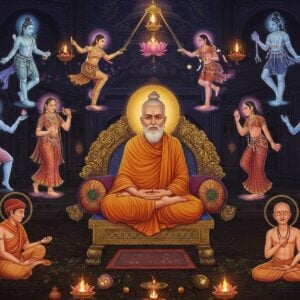
Understanding the connections and differences between Hinduism and Sikhism offers a glimpse into the rich spiritual heritage of the Indian subcontinent. These two faiths, woven together by history and culture, share a common thread while also expressing unique identities. Let’s explore this fascinating interplay of shared legacy and distinct practices.
A Journey Through Time: Origins and Historical Context
Hinduism, a venerable faith with roots stretching back over 4,000 years, has evolved through various periods, from the Vedic era to the Upanishadic philosophies, culminating in the Bhakti movement with its emphasis on personal devotion.
Sikhism, a relatively younger faith, emerged in the 15th century in Punjab, founded by Guru Nanak Dev Ji. Born from the socio-religious landscape of the time, influenced by both the Bhakti and Sufi traditions, Sikhism carved its own unique path.
Over the centuries, Hindu and Sikh communities have intertwined, particularly during the Mughal rule and the British Raj, sharing cultural nuances while preserving their distinct traditions. This shared history adds another layer to the rich tapestry of their relationship.
Shared Foundations: Philosophical Connections
At the heart of both Hinduism and Sikhism lies the belief in a single, all-pervading divine reality. Though expressed differently, this shared understanding forms a fundamental connection. Hindus may venerate a pantheon of deities, often viewing them as manifestations of the one supreme Brahman. Sikhs, however, embrace a strict monotheism, centered around the concept of Ik Onkar, the one true God.
The concept of Bhakti, or loving devotion, holds a central place in both traditions. This focus on the inner spiritual journey, rather than mere external rituals, allows for a deep personal connection with the divine. The paths may differ, but the yearning for spiritual connection remains a shared aspiration.
The principles of karma and reincarnation also feature prominently in both faiths. While Hinduism delves into the intricacies of these concepts, Sikhism offers its unique interpretation, emphasizing ethical living and truthful actions as pathways to spiritual growth.
Distinct Identities: Beliefs and Practices
Sikhism distinguishes itself through its rejection of the caste system and idol worship. This emphasis on equality and selfless service finds beautiful expression in the Langar, the community kitchen where everyone, regardless of background, shares a meal. This practice reflects the core Sikh values of inclusivity and compassion.
The Guru Granth Sahib, the revered scripture of Sikhism, serves as the eternal Guru, guiding followers on their spiritual path. This differs from Hinduism’s diverse scriptural traditions, which offer a vast array of teachings and philosophies.
Sikhism also introduces unique practices like the Five Ks, outward symbols of Sikh identity, and the Khalsa, a dedicated community of initiated Sikhs. These practices reinforce a distinct religious and cultural persona, setting it apart from Hindu traditions while still respecting the shared heritage.
Celebrating Life: Rituals and Festivals
Both Hinduism and Sikhism boast a vibrant tapestry of festivals that illuminate their cultural richness. Diwali, a festival of lights, is celebrated by both communities, but with distinct meanings. For Hindus, it marks the return of Lord Rama, while Sikhs commemorate the release of Guru Hargobind Ji. This shared celebration highlights the diverse interpretations within a common cultural context.
Hindu festivals such as Holi, a vibrant celebration of color, and Navratri, dedicated to the divine feminine, bring communities together in joyous devotion. Similarly, Sikh celebrations like Vaisakhi, marking the birth of the Khalsa, Guru Nanak Jayanti, celebrating the birth of Guru Nanak, and Gurpurabs, honoring the lives of the Sikh Gurus, emphasize important historical events and spiritual teachings.
A Shared Existence: Cultural and Social Interactions
In regions like Punjab, Hindu and Sikh communities have coexisted for centuries, sharing languages, traditions, and cultural practices, weaving a rich tapestry of interconnectedness. This shared cultural heritage fosters harmony and understanding, creating a vibrant social landscape.
Interfaith marriages, common in these communities, often blend religious customs, creating families where diverse traditions enrich daily life. This intermingling of customs adds a unique dimension to family celebrations and rituals.
Music and the arts further demonstrate this mutual influence. The use of ragas in devotional music, for instance, creates a shared artistic vocabulary that transcends religious boundaries.
Navigating the Modern World: Contemporary Issues and Relations
In the modern world, Hindu and Sikh communities face challenges related to identity preservation and religious freedom. Globalization and migration influence how these faiths are practiced and perceived in diverse societies.
Digital media plays a crucial role in connecting diaspora communities with their roots, providing new avenues for religious education and community building. It also presents new challenges in navigating the complexities of online information and misinformation.
Interfaith dialogue initiatives are vital in bridging gaps and fostering mutual respect between communities. These efforts promote understanding and appreciation of each other’s beliefs and practices, contributing to a more harmonious society.
Honoring Traditions with Poojn.in: Your Spiritual Companion
At poojn.in, we understand the deep significance of your spiritual practices. We offer a wide selection of authentic items for both Hindu and Sikh traditions, making it easier for you to honor your faith. Whether you’re seeking a beautifully crafted Panchmukhi Hanuman idol or a Lord Kubera murti for your Hindu puja, or Rumala Sahib and Chaur Sahib for your Sikh devotional practices, we’ve got you covered. Explore our collection of decoratives and holy books to enhance your spiritual journey.
Our products come with detailed descriptions to guide you on their religious significance and proper usage. We deliver across India with secure packaging, ensuring your sacred items reach you safely and respectfully. For any assistance or to learn more, reach out to us via call at 03369029784, WhatsApp at 9476142738, or visit our website www.poojn.in.
Embracing a Shared Future: Harmony in Diversity
Hinduism and Sikhism, with their rich tapestry of shared beliefs and distinct practices, offer a powerful testament to the beauty of diversity. Rooted in devotion, ethical living, and community service, these faiths continue to flourish, adapting to contemporary challenges while preserving their core teachings. By honoring their shared heritage and celebrating their differences, we can build a future where cultural richness and spiritual depth thrive side-by-side, enriching the lives of generations to come. You can read more articles about spirituality and Dharma & Karma here:
- Hinduism: A Celebration of Diversity and Tradition
- Hindu Rituals: A Guide to Coping with Grief and Loss
- Dharma and Karma in Hinduism Explained
- Hinduism’s Global Reach: A Look at Its Diverse Traditions
FAQs: Hinduism & Sikhism
Connections and Differences
How are Hinduism and Sikhism related? Hinduism and Sikhism share a rich historical and cultural tapestry, both originating in the Indian subcontinent. Sikhism, emerging later, was influenced by the socio-religious context shaped, in part, by Hindu traditions. This shared heritage provides a foundation for understanding their interconnectedness.
How are Hinduism and Sikhism connected? Beyond their geographical origins, these two faiths share certain philosophical concepts and social practices. Both emphasize the importance of moral conduct, devotion to a higher power, and the significance of community in spiritual life. This shared emphasis on ethical living and community bonds creates a common ground between the two.
What do Hinduism and Sikhism have in common? Core beliefs like karma, the cycle of birth and rebirth (samsara), and the pursuit of liberation (moksha in Hinduism, mukti in Sikhism) are shared by both religions. They also value meditation and devotion as pathways to spiritual growth and understanding.
Similarities in Practice
What are some similarities between Hinduism and Sikhism? Both Hinduism and Sikhism place a strong emphasis on ethical conduct and selfless service (seva). They also share certain festivals, like Diwali, although the interpretations and celebrations may differ. Music and hymns play an integral role in the devotional practices of both traditions.
Why do Hinduism and Sikhism celebrate some of the same festivals? Due to their shared cultural history, certain festivals hold significance in both religions. Diwali, for example, is celebrated in both traditions but with different narratives and customs. This highlights the cultural exchange and intertwined history of the two.
Understanding Different Perspectives on God
Do Hinduism and Sikhism have the same view on God? Hinduism encompasses a diverse range of beliefs, often perceived as polytheistic due to its pantheon of deities. However, many Hindus understand these deities as manifestations of one ultimate reality, Brahman. Sikhism, in contrast, is strictly monotheistic, emphasizing the belief in one formless God, Ik Onkar.
Unique Aspects of Sikhism
Are there any distinct beliefs in Sikhism that differ from Hinduism? Yes, Sikhism explicitly rejects the caste system and idol worship, both of which can be found in Hindu practices. Sikhism strongly emphasizes equality among all beings and the remembrance of God through meditation and service. This focus on equality and direct connection with the divine distinguishes Sikhism from some Hindu practices.


